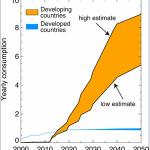Global Deal Reached to Limit Use of Hydrofluorocarbons

A global deal to limit the use of hydrofluorocarbons (HFCs) in the battle to combat climate change is a “monumental step forward”, John Kerry, the US secretary of state, has said.
The agreement, announced on Saturday morning after all-night negotiations in Kigali, Rwanda, caps and reduces the use of HFCs – a key contributor to greenhouse gases – in a gradual process beginning in 2019, with action by developed countries including the US, the world’s second worst polluter.
More than 100 developing countries, including China, the world’s top carbon dioxide emitter, will start taking action in 2024, sparking concern from some groups that the action would be implemented too slowly to make a difference. A small group of countries, including India, Pakistan and some Gulf states, also pushed for and secured a later start in 2028, saying their economies need more time to grow. That is three years earlier than India, the world’s third worst polluter, had first proposed.
Worldwide use of HFCs has soared in the past decade as rapidly growing countries like China and India have widely adopted air conditioning in homes, offices and cars. But HFC gases are thousands of times more destructive to the climate than carbon dioxide, and scientists say their growing use threatens to undermine the Paris accord by 195 countries, an agreement last year to reduce climate emissions.
President Barack Obama praised the deal on Saturday morning, calling the agreement “an ambitious and far reaching solution” to a “rapidly growing threat to the health of our planet”.
“In addition to today’s amendment, countries last week crossed the threshold for the Paris Agreement to enter into force and reached a deal to constrain international aviation emissions,” he said in a statement. “Together, these steps show that, while diplomacy is never easy, we can work together to leave our children a planet that is safer, more prosperous, more secure, and more free than the one that was left for us.”
Kerry said on Saturday: “It’s a monumental step forward that addresses the needs of individual nations but it will give us the opportunity to reduce the warming of the planet by an entire half a degree centigrade. Agreeing a deal to phase down the use of HFCs is the single most important step we can take to limit the warming of the planet. We all know that the window of time that we have to prevent the worst climate impacts from happening is in fact narrowing, and it is closing fast.”
Environmental groups had hoped the deal could reduce global warming by a half a degree celsius by the end of this century. This agreement gets about 90% of the way there, said Durwood Zaelke, president of the Institute for Governance and Sustainable Development. Zaelke’s group said this would mean the “largest temperature reduction ever achieved by a single agreement”.
The new agreement is “equal to stopping the entire world’s fossil-fuel CO2 emissions for more than two years,” said David Doniger, climate and clean air programme director with the Natural Resources Defense Council.
Experts said they hoped market forces would help speed up the limits agreed to in the deal. “Compromises had to be made, but 85% of developing countries have committed to the early schedule starting 2024, which is a very significant achievement,” Clare Perry of the Environmental Investigation Agency said.
HFCs were introduced in the 1980s as a substitute for ozone-depleting gases but are now considered a uniquely dangerous threat to the climate. According to the Berkeley National Laboratory, about 1.6bn new air-conditioning units are expected to be switched on by 2050, with the potential of raising global temperatures significantly. Air conditioning is largest cause of HFC growth, but the gases are also used in fire suppressants, insulating foams, inhalers and data centre cooling systems.
Small island states and many African countries had pushed for quick action, saying they face the biggest threat from climate change. “It may not be entirely what the islands wanted, but it is a good deal,” the minister-in-assistance to the president of the Marshall Islands, Mattlan Zackhras, said. “We all know we must go further, and we will go further.”
HFCs are less plentiful than CO2, but Kerry said last month that they currently emit as much pollution as 300 coal-fired power plants each year.
HFCs do not harm the ozone layer like chlorofluorocarbons and similar gases that were eliminated under the 1987 Montreal Protocol. The entire world ratified that agreement, helping to repair holes in the ozone that help shield the planet from the harmful rays of the sun. The aim of this meeting was to attach an amendment to that treaty dealing specifically with HFCs.
